Liposuction > Procedures
Also known as lipoplasty, liposuction
slims and reshapes specific areas of the body by removing excess fat
deposits, improving your body contours and proportion, and ultimately,
enhancing your self-image.
Beauty for life:
 Enhancing
your appearance with liposuction Enhancing
your appearance with liposuction
Despite
good health and a reasonable level of fitness, some people may still
have a body with disproportionate contours due to localized fat
deposits. These areas may be due to family traits rather than a lack of
weight control or fitness. Liposuction
slims and reshapes specific areas of the body by removing excess fat
deposits, improving your body contours and proportion, and ultimately,
enhancing your self-image. Liposuction techniques may be used to reduce localized fat deposits of the:
 Thighs Thighs
 Hips
and buttocks Hips
and buttocks
 Abdomen
and waist Abdomen
and waist
 Upper
arms Upper
arms
 Back Back
 Inner
knee Inner
knee
 Chest
area Chest
area
 Cheeks,
chin and neck Cheeks,
chin and neck
 Calves
and ankles Calves
and ankles
In
some cases, liposuction is performed alone, in other cases it is used
with plastic surgery procedures such as a facelift, breast reduction or
a tummy tuck. What it won’t do:
Liposuction is not a treatment for obesity or a substitute for proper
diet and exercise. It is also not an effective treatment for cellulite,
the dimpled skin that typically appears on the thighs, hips and
buttocks, or loose saggy skin. Back to Top What to expect during your consultationThe
success and safety of your liposuction procedure depends very much on
your complete candidness during your consultation. You’ll be asked a
number of questions about your health, desires and lifestyle.  Be prepared to discuss: Be prepared to discuss:
 Why you want the surgery, your expectations and desired outcome Why you want the surgery, your expectations and desired outcome
 Medical conditions, drug allergies and medical treatments Medical conditions, drug allergies and medical treatments
 Use of current medications, vitamins, herbal supplements, alcohol, tobacco and drugs Use of current medications, vitamins, herbal supplements, alcohol, tobacco and drugs
 Previous surgeries Previous surgeries
Your surgeon may also:
 Evaluate your general health status and any pre-existing health conditions or risk factors Evaluate your general health status and any pre-existing health conditions or risk factors
 Take photographs for your medical record Take photographs for your medical record
 Discuss your options and recommend a course of treatment Discuss your options and recommend a course of treatment
 Discuss likely outcomes of liposuction and any risks or potential complications Discuss likely outcomes of liposuction and any risks or potential complications
Back to Top
Preparing for surgery
 Prior
to surgery, you may be asked to: Prior
to surgery, you may be asked to:
 Get lab testing or a medical evaluation Get lab testing or a medical evaluation
 Take certain medications or adjust your current medications Take certain medications or adjust your current medications
 Stop smoking well in advance of surgery Stop smoking well in advance of surgery
 Avoid taking aspirin, anti-inflammatory drugs and herbal supplements as they can increase bleeding Avoid taking aspirin, anti-inflammatory drugs and herbal supplements as they can increase bleeding
Special instructions you receive will cover:
 What to do on the day of surgery What to do on the day of surgery
 The use of anesthesia during your liposuction The use of anesthesia during your liposuction
 Post-operative care and follow-up Post-operative care and follow-up
Your
plastic surgeon will also discuss where your procedure will be
performed. Liposuction may be performed in an accredited office-based
surgical center, outpatient or ambulatory surgical center, or a
hospital. You’ll need helpIf
your liposuction is performed on an outpatient basis, be sure to
arrange for someone to drive you to and from surgery and to stay with
you for at least the first night following surgery. Back to Top Procedural Steps:What happens during liposuction?Step 1 – AnesthesiaMedications
are administered for your comfort during the surgical procedures. The
choices include intravenous sedation and general anesthesia. Your
doctor will recommend the best choice for you. Step 2 – The incisionLiposuction is performed through small, inconspicuous incisions. First,
sterile liquid solution is infused to reduce bleeding and trauma. Then
a thin hollow tube, or cannula, is inserted through these incisions to
loosen excess fat using a controlled back and forth motion. The dislodged fat is then suctioned out of the body using a surgical vacuum or syringe attached to the cannula. Problem areas that can be addressed with liposuction: 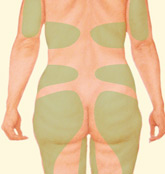 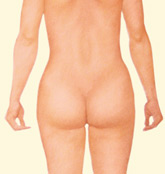
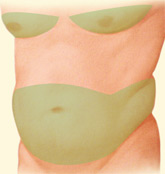 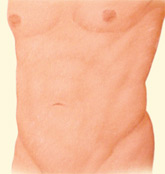
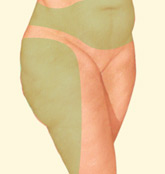 
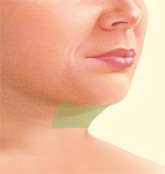 
Step 3 – See the resultsYour
improved body contour will be apparent when the swelling and fluid
retention commonly experienced following liposuction subside. With
continued practices of healthy diet and fitness, the loss of excess
fatty tissue should be permanently maintained. However, substantial
weight gain can alter an otherwise permanent result. Back to Top Important facts about the safety and risks of liposuction The
decision to have liposuction is extremely personal and you’ll have to
decide if the benefits will achieve your goals and if the risks and
potential complications are acceptable. The
decision to have liposuction is extremely personal and you’ll have to
decide if the benefits will achieve your goals and if the risks and
potential complications are acceptable.
Your
plastic surgeon and/or staff will explain in detail the risks
associated with surgery. You will be asked to sign consent forms to
ensure that you fully understand the procedure you will undergo and any
risks or potential complications. Possible risks of liposuction include:
 Uneven contours Uneven contours
 Rippling or loose skin Rippling or loose skin
 Skin or nerve damage Skin or nerve damage
 Irregular pigmentation Irregular pigmentation
 Infection Infection
 Fat clots Fat clots
 Blood clots Blood clots
 Excessive fluid loss or fluid accumulation Excessive fluid loss or fluid accumulation
 Unfavorable scarring Unfavorable scarring
 Thermal burn or heat injury from ultrasound with the ultrasound-assisted lipoplasty technique Thermal burn or heat injury from ultrasound with the ultrasound-assisted lipoplasty technique
 Anesthesia risks Anesthesia risks
 Bleeding (hematoma) Bleeding (hematoma)
 Change in skin sensation Change in skin sensation
 Skin discoloration or swelling Skin discoloration or swelling
 Asymmetry Asymmetry
 Pain, which may persist Pain, which may persist
 Damage to deeper structures such as nerves, blood vessels, muscles, lungs, and abdominal organs Damage to deeper structures such as nerves, blood vessels, muscles, lungs, and abdominal organs
 Poor wound healing Poor wound healing
 Persistent swelling in the legs Persistent swelling in the legs
 Deep vein thrombosis, cardiac and pulmonary complications Deep vein thrombosis, cardiac and pulmonary complications
 Possibility of revisional surgery Possibility of revisional surgery
Is it right for me?If
you are bothered by excess fat deposits - located anywhere on your body
- that don’t respond to diet or exercise, liposuction may be right for
you. Ideal candidates for liposuction are:
 Adults within 30% of their ideal weight who have firm, elastic skin and good muscle tone Adults within 30% of their ideal weight who have firm, elastic skin and good muscle tone
 Healthy individuals who do not have a life-threatening illness or medical conditions that can impair healing Healthy individuals who do not have a life-threatening illness or medical conditions that can impair healing
 Non-smokers Non-smokers
 Individuals with a positive outlook and specific goals in mind for body contouring Individuals with a positive outlook and specific goals in mind for body contouring
Be sure to ask questions:
It’s very important to ask your plastic surgeon questions about your
liposuction procedure. It’s natural to feel some anxiety, whether it’s
excitement for your anticipated new look or a bit of preoperative
stress. Don’t be shy about discussing these feelings with your plastic
surgeon. Be carefulFollowing
your physician’s instructions is key to the success of your surgery. It
is important that the surgical incisions are not subjected to excessive
force, swelling, abrasion, or motion during the time of healing. Your
doctor will give you specific instructions on how to care for yourself. Back to Top My recoveryOnce
your procedure is completed, a compression garment or elastic bandages
may cover treatment areas. These help to control swelling and compress
the skin to your new body contours. In addition, small temporary drains may be placed in existing incisions beneath the skin to remove any excess blood or fluid. You will be given specific instructions that may include:
How to care for the surgical site(s), medications to apply or take
orally to aid healing and reduce the potential for infection, specific
concerns to look for at the surgical site or in your general health,
and when to follow up with your plastic surgeon. A special note:
Secondary procedures may sometimes be recommended to reduce excess
skin. Special considerations are needed when large amounts - usually
more than 5 liters of fat - are suctioned. Be sure to ask your plastic surgeon specific questions about what you can expect during your individual recovery period.
 Where will I be taken after my surgery is complete? Where will I be taken after my surgery is complete?
 What medication will I be given or prescribed after surgery? What medication will I be given or prescribed after surgery?
 Will I have dressings/bandages after surgery? Will I have dressings/bandages after surgery?
 When will they be removed? When will they be removed?
 Are stitches removed? When? Are stitches removed? When?
 When can I resume normal activity and exercise? When can I resume normal activity and exercise?
 When do I return for follow-up care? When do I return for follow-up care?
When you go homeIf
you experience shortness of breath, chest pains, or unusual heart
beats, seek medical attention immediately. Should any of these
complications occur, you may require hospitalization and additional
treatment. The
practice of medicine and surgery is not an exact science. Although good
results are expected, there is no guarantee. In some situations, it may
not be possible to achieve optimal results with a single surgical
procedure and another surgery may be necessary. Back to Top
The results will be long-lasting
 It
may take several months for the swelling to fully dissipate. As it does,
your new contours and enhanced self-image should continue to develop. It
may take several months for the swelling to fully dissipate. As it does,
your new contours and enhanced self-image should continue to develop.
The
fulfillment you feel from the initial results of liposuction should
continue as long as you control your weight and maintain a healthy
lifestyle. A
significant weight gain can reverse your results. Following
liposuction, your slimmer and better-proportioned body should more
accurately reflect the healthy and active life you lead. Back to Top
How much will liposuction cost?
 Cost
is always a consideration in elective surgery. Prices for liposuction
can vary widely. A surgeon’s cost for liposuction may vary based
on his or her experience, the type of procedure used, as well as geographic
office location. Cost
is always a consideration in elective surgery. Prices for liposuction
can vary widely. A surgeon’s cost for liposuction may vary based
on his or her experience, the type of procedure used, as well as geographic
office location.
Many plastic surgeons offer patient financing plans, so be sure to ask. Cost may include:
 Surgeon’s fee Surgeon’s fee
 Hospital or surgical facility costs Hospital or surgical facility costs
 Anesthesia fees Anesthesia fees
 Prescriptions for medication Prescriptions for medication
 Post-surgery garments Post-surgery garments
 Medical tests Medical tests
Your satisfaction involves more than a feeWhen
choosing a plastic surgeon for liposuction, remember that the surgeon’s
experience and your comfort with him or her are just as important as
the final cost of the surgery. Most health insurance does not cover cosmetic surgery or its complications. Back to Top Words to know
 Breast reduction: Also known as reduction mammaplasty, reduction of breast size by surgery. Breast reduction: Also known as reduction mammaplasty, reduction of breast size by surgery.
 Cannula: A thin, hollow tube used during liposuction to loosen excess fat. Cannula: A thin, hollow tube used during liposuction to loosen excess fat.
 Facelift: A surgical procedure, also known as rhytidectomy, to reduce sagging of the mid-face, jowls and neck. Facelift: A surgical procedure, also known as rhytidectomy, to reduce sagging of the mid-face, jowls and neck.
 General anesthesia: Drugs and/or gases used during an operation to relieve pain and alter consciousness. General anesthesia: Drugs and/or gases used during an operation to relieve pain and alter consciousness.
 Hematoma: Blood pooling beneath the skin. Hematoma: Blood pooling beneath the skin.
 Intravenous sedation: Sedatives administered by injection into a vein to help you relax. Intravenous sedation: Sedatives administered by injection into a vein to help you relax.
 Lipoplasty:
Another term for liposuction. Liposuction: Also called lipoplasty or
suction lipectomy, this procedure vacuums out fat from beneath the
skin’s surface to reduce fullness. Lipoplasty:
Another term for liposuction. Liposuction: Also called lipoplasty or
suction lipectomy, this procedure vacuums out fat from beneath the
skin’s surface to reduce fullness.
 Local anesthesia: A drug injected directly to the site of an incision during an operation to relieve pain. Local anesthesia: A drug injected directly to the site of an incision during an operation to relieve pain.
 Suction lipectomy: Another term for liposuction. Suction lipectomy: Another term for liposuction.
 Sutures: Stitches used by surgeons to hold skin and tissue together. Sutures: Stitches used by surgeons to hold skin and tissue together.
 Tumescent or super-wet liposuction: Involves an infusion of saline solution with adrenaline and possibly anesthetic prior to removal of excess fat. Tumescent or super-wet liposuction: Involves an infusion of saline solution with adrenaline and possibly anesthetic prior to removal of excess fat.
 Tummy tuck: A surgical procedure, also known as abdominoplasty, to correct the apron of excess skin hanging over your abdomen. Tummy tuck: A surgical procedure, also known as abdominoplasty, to correct the apron of excess skin hanging over your abdomen.
 Ultrasound-assisted lipoplasty: Uses ultrasonic energy to liquefy excess fat prior to surgical suctioning. Ultrasound-assisted lipoplasty: Uses ultrasonic energy to liquefy excess fat prior to surgical suctioning.
Back to Top Questions to ask my plastic surgeonUse this checklist as a guide during your consultation
 Are you certified by the American Board of Plastic Surgery? Are you certified by the American Board of Plastic Surgery?
 Are you a member of the American Society of Plastic Surgeons? Are you a member of the American Society of Plastic Surgeons?
 Were you trained specifically in the field of plastic surgery? Were you trained specifically in the field of plastic surgery?
 How many years of plastic surgery training have you had? How many years of plastic surgery training have you had?
 Do you have hospital privileges to perform this procedure? Do you have hospital privileges to perform this procedure?
 If so, at which hospitals? If so, at which hospitals?
 Is
the office-based surgical facility accredited by a nationally- or
state-recognized accrediting agency, or is it state-licensed or
Medicare-certified? Is
the office-based surgical facility accredited by a nationally- or
state-recognized accrediting agency, or is it state-licensed or
Medicare-certified?
 Am I a good candidate for this procedure? Am I a good candidate for this procedure?
 What will be expected of me to get the best results? What will be expected of me to get the best results?
 Where and how will you perform my procedure? Where and how will you perform my procedure?
 What surgical technique is recommended for me? What surgical technique is recommended for me?
 How long of a recovery period can I expect, and what kind of help will I need during my recovery? How long of a recovery period can I expect, and what kind of help will I need during my recovery?
 What are the risks and complications associated with my procedure? What are the risks and complications associated with my procedure?
 How are complications handled? How are complications handled?
 How can I expect my body to look over time? How can I expect my body to look over time?
 After pregnancy? After pregnancy?
 What are my options if I am dissatisfied with the cosmetic outcome of my liposuction? What are my options if I am dissatisfied with the cosmetic outcome of my liposuction?
 Do you have before-and-after photos I can look at for this procedure and what results are reasonable for me? Do you have before-and-after photos I can look at for this procedure and what results are reasonable for me?
Back to Top Back to Top
|





